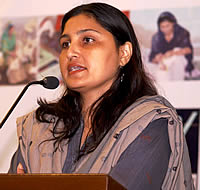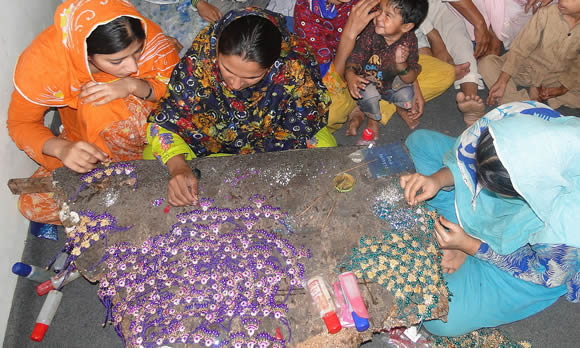Posted May 20, 2011
Why home-based women workers need social protection urgently
By Bushra Khaliq
April 26, 2011
 The neoliberalization of the late 1980s resulted in the increasing informalization and casualization of the Pakistani labor market, spawning a growth in home-based work almost exclusively performed by women and, frequently, their children. This informal sector consists of small units producing goods or services. Its activities are characterized by low levels of capital and skill, with little access to organized markets and technologies. The working conditions are poor; the incomes low and unstable. Highly labor intensive, this sector stands outside the scope and purview of the official statistical machinery or government regulation.
The neoliberalization of the late 1980s resulted in the increasing informalization and casualization of the Pakistani labor market, spawning a growth in home-based work almost exclusively performed by women and, frequently, their children. This informal sector consists of small units producing goods or services. Its activities are characterized by low levels of capital and skill, with little access to organized markets and technologies. The working conditions are poor; the incomes low and unstable. Highly labor intensive, this sector stands outside the scope and purview of the official statistical machinery or government regulation.
The government of Pakistan has not developed any social or economic policy or program for home-based women workers. According to the constitution of Pakistan, women are guaranteed rights to enter into any business, but when we review the labor laws, we find there is not even a single applicable one. Home-based workers are not covered by the definition of a worker under the Payment of Wages Act, 1936, West Pakistan Shops and Establishment Act, 1969, Industrial Relations Ordinance, 1969 and the Maternity Benefits Ordinance, 1958 and Employees Old Age Benefit act.
The Home Based Work Convention 1996 (C-177), was adopted by ILO in June 1996. This Convention recognized the importance of home-based workers, their contribution to the global economy and the need to protect their rights as workers, but the convention has not yet been ratified by Pakistan.

Not counted as workers, home-based women workers have the least contact with mainstream workers, movements or trade unions. They are usually illiterate, unorganized and ignored. Frequently they are not even provided with tools for their work, but must secure their own needles, scissors, colors and sometimes thread and chemicals. Nor does the price they are paid include the cost of their utility bill.
Home-based women workers are the poorest and most unprotected segment of society because the work is unregulated. Much of the work is repetitive and hazardous. Cultural norms and unfavorable conditions have also left women more vulnerable. They usually have very limited knowledge about the market. Often they do not even know the name of the company they are producing for. This leaves them at the mercy of contractors, sub-contractors and middle men. But they are dependent on these contractors because a home-based business is usually conducted through personal contact.
According to various estimates, over 20 million Pakistani women are engaged in home-based work in garment, embellishment, bangle-making, shoe stitching, embroidery, carpet weaving, jewelry, leather products, steel scissors, mobile covers, preparing dry fruit and shelling prawns. Much of their work is tedious, but in their embroidery reveals their capacity for creativity. They create masterpieces.
While economic conditions compel women to work in their homes in order to meet day-to-day expenses, they earn between Rs 10- Rs 50 (less than one dollar) a day and put in 12-16 hours. .
Over the last decade, Pakistan’s informal sector has grown, prompting alarm bells to go off. The government views this development as a business method to evade taxes. Currently, out of an annual $160 billion economy, more than $32 billion is produced by the informal sector. Yet the government remains unwilling to address the needs of the poorest, most vulnerable workers.
A number of civil society organizations have been highlighting the issues of these home-based women workers. They are helping them to organize into associations and unions, and to lobby the government to extend much needed social protection. At a federal level little has been done. Now, with the devolution of the labor ministry to the provinces, it is the responsibility of the provincial government to address these issues.
Every year on May Day and International Women Day, women workers take to roads across the country to tell the decision-makers that they are workers, and demand that they be counted and recognized their rights. Women are in no mood to fade away. They are not asking for charity—like the Benazir Income Support Program—but to be recognized as workers under labor laws. Recognize them!
(The writer is National Coordinator, World March of Women, in Pakistan, and can be accessed at bushra.khaliq@yahoo.com)

Comments
2 responses to “Plight of women workers in Pakistan’s informal sector”
I’m interested in women’s employment issues in Pakistan. Does your organization have information on that?
Thanks
This is a note in response to a query by Sarah Tirmazi. Sarah, you might be interested in the following Against the Current interview we did with Bushra Khaliq when she was in Detroit for the US Social Forum:
http://www.solidarity-us.org/site/node/3093
There are a few articles by her we have printed. You can find them using the search function at the top of the page. She mostly works with women in the informal sector.